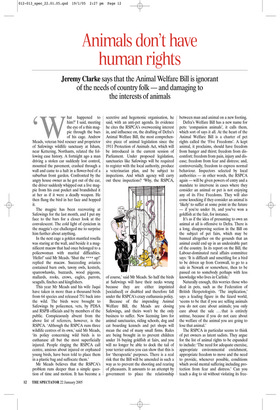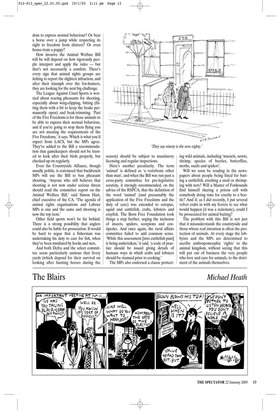Animals don’t have human rights
Jeremy Clarke says that the Animal Welfare Bill is ignorant of the needs of country folk — and damaging to the interests of animals ‘What happened to him?’ I said, meeting the eye of a thin magpie through the bars of his cage. Andrew Meads, veteran bird rescuer and proprietor of Safewings wildlife sanctuary at Isham, near Kettering, Northants, related the following case history. A fortnight ago a man driving a stolen car suddenly lost control, mounted the pavement, crashed through a wall and came to a halt in a flower-bed of a suburban front garden. Confronted by the angry house owner as he got out of the car, the driver suddenly whipped out a live magpie from his coat pocket and brandished it at her as if it were a deadly weapon. He then flung the bird in her face and hopped it.
The magpie has been recovering at Safewings for the last month, and I put my face to the bars for a closer look at the convalescent. The cold light of cynicism in the magpie’s eye challenged me to surprise him further about anything.
In the next cage a golden mantled rosella was staring at the wall, and beside it a magnificent macaw that had once belonged to a policewoman with marital difficulties. ‘Hello!’ said Mr Meads. ‘Shut the **** up!’ replied the macaw. Succeeding aviaries contained barn owls, tawny owls, kestrels, sparrowhawks, buzzards, wood pigeons, mallards, rooks, crows, eagles, parrots, seagulls, finches and kingfishers.
This year Mr Meads and his wife Jaqui have taken in more than a thousand birds from 64 species and released 751 back into the wild. The birds were brought to Safewings by policemen, vets, by PDSA and RSPB officials and by members of the public. Conspicuously absent from the above list of referrers, however, is the RSPCA. ‘Although the RSPCA runs three wildlife centres of its own,’ said Mr Meads, ‘its policy concerning wild birds is to euthanase all but the most superficially injured. People ringing the RSPCA call centre, anxious about injured or orphaned young birds, have been told to place them in a plastic bag and suffocate them.’ Mr Meads believes that the RSPCA’s problem runs deeper than a simple question of time and motion. It has become a secretive and hegemonic organisation, he said, with an anti-pet agenda. In evidence he cites the RSPCA’s overweening interest in, and influence on, the drafting of Defra’s Animal Welfare Bill, the most comprehensive piece of animal legislation since the 1911 Protection of Animals Act, which will be introduced in the current session of Parliament. Under proposed legislation, sanctuaries like Safewings will be required to register with the local authority, produce a veterinarian plan, and be subject to inspections. And which agency will carry out these inspections? ‘Why, the RSPCA, of course,’ said Mr Meads. So half the birds at Safewings will have their necks wrung because they are either imprinted [socialised] or disabled and therefore fall under the RSPCA’s crazy euthanasia policy.
Because of the impending Animal Welfare Bill, the Meads are closing Safewings, and theirs won’t be the only business to suffer. New licensing laws for animal sanctuaries, riding schools, dog and cat boarding kennels and pet shops will mean the end of many small firms. Rules are being brought in to prevent children under 16 buying goldfish at fairs, and you will no longer be able to dock the tail of your terrier unless you can show that this is for ‘therapeutic’ purposes. There is a real risk that the Bill will be amended in such a way as to prevent the shooting and rearing of pheasants. It amounts to an attempt by government to place the relationship between man and animal on a new footing.
Defra’s Welfare Bill has a new name for pets: ‘companion animals’, it calls them, which sort of says it all. At the heart of the Animal Welfare Bill is a charter of pet rights called the ‘Five Freedoms’. A kept animal, it proclaims, should have freedom from hunger and thirst; freedom from discomfort; freedom from pain, injury and disease; freedom from fear and distress; and, controversially, freedom to express normal behaviour. Inspectors selected by local authorities — in other words, the RSPCA again — will be given powers of entry and a mandate to intervene in cases where they consider an animal or pet is not enjoying any of its Five Freedoms. They will also come knocking if they consider an animal is ‘likely’ to suffer at some point in the future — if you’re under 16, and you’ve won a goldfish at the fair, for instance.
It’s as if the idea of presuming to own an animal at all is offensive to Defra. There is a long, disapproving section in the Bill on the subject of pet fairs, which may be banned altogether on the grounds that an animal could end up in an undesirable part of the country. In its report on the Bill, the Labour-dominated rural affairs committee says: ‘It is difficult and unsettling for a bird to be driven up from Cornwall, to go to a sale in Newark or somewhere, then to be passed on to somebody perhaps with less knowledge who lives in Carlisle.’ Naturally enough, this worries those who deal in pets, such as the Federation of British Herpetologists. ‘The implication,’ says a leading figure in the lizard world, ‘seems to be that if you are selling animals you do not care about animals; you only care about the sale ... that is entirely untrue, because if you do not care about the welfare of the animal you are going to lose that animal.’ The RSPCA in particular seems to think of pet owners as latent sadists. They argue for the list of animal rights to be expanded to include: ‘The need for adequate exercise, appropriate environmental enrichment, appropriate freedom to move and the need to provide, whenever possible, conditions which avoid mental suffering including protection from fear and distress.’ Can you teach a dog to sit without violating its free dom to express normal behaviour? Or beat a horse over a jump while respecting its right to freedom from distress? Or even house-train a puppy?
How invasive the Animal Welfare Bill will be will depend on how rigorously people interpret and apply the rules — but that’s not necessarily a comfort. There’s every sign that animal rights groups are itching to report the slightest infraction, and after their triumph over the fox-hunters, they are looking for the next big challenge.
The League Against Cruel Sports is worried about rearing pheasants for shooting, especially about wing-clipping, bitting (fitting them with a bit to keep the beaks permanently open) and beak-trimming. ‘Part of the Five Freedoms is for those animals to be able to express their normal behaviour, and if you’re going to stop them flying you are not meeting the requirements of the Five Freedoms,’ it says. Which is what you’d expect from LACS, but the MPs agree. They’ve added to the Bill a recommendation that gamekeepers should not be trusted to look after their birds properly, but checked up on regularly.
Even the Countryside Alliance, though usually politic, is convinced that backbench MPs will use the Bill to ban pheasant shooting. ‘Anyone who still believes that shooting is not now under serious threat should read the committee report on the Animal Welfare Bill,’ said Simon Hart, chief executive of the CA. ‘The agenda of animal rights organisations and Labour MPs is one and the same and shooting is now the top item.’ Other field sports won’t be far behind. There is a strong possibility that anglers could also be liable for prosecution. It would be hard to argue that a fisherman was undertaking his duty to care for fish, when they’ve been mutilated by hooks and nets.
And both Defra and the select committee seem particularly anxious that livery yards (which depend for their survival on looking after hunting horses during the season) should be subject to mandatory licensing and regular inspections.
Here’s another peculiarity. The term ‘animal’ is defined as ‘a vertebrate other than man’, and when the Bill was run past a cross-party committee for pre-legislative scrutiny, it strongly recommended, on the advice of the RSPCA, that the definition of the word ‘animal’ (and presumably the application of the Five Freedoms and the duty of care) was extended to octopus, squid and cuttlefish, crabs, lobsters and crayfish. The Born Free Foundation took things a step further, urging the inclusion of insects, spiders, scorpions and centipedes. And once again, the rural affairs committee failed to add common sense. ‘While this assessment [into cuttlefish pain] is being undertaken,’ it said, ‘a code of practice should be issued giving details of humane ways in which crabs and lobsters should be stunned prior to cooking.’ The MPs also endorsed a clause protect ing wild animals, including ‘mussels, newts, shrimp, species of beetles, butterflies, moths, snails and spiders’.
Will we soon be reading in the newspapers about people being fined for baiting a cuttlefish, crushing a snail or shrimping with nets? Will a Master of Foxhounds find himself sharing a prison cell with somebody doing time for cruelty to a beetle? And if, as I did recently, I put several velvet crabs in with my ferrets to see what would happen (it was a stalemate), could I be prosecuted for animal baiting?
The problem with this Bill is not just that it misunderstands the countryside and those whose real intention is often the protection of animals. At every stage the lobbyists and the MPs are determined to ascribe anthropomorphic ‘rights’ to the animal kingdom, without seeing that this will put out of business the very people who love and care for animals, to the detriment of the animals themselves.














































 Previous page
Previous page